| Listing 1 - 10 of 26 | << page >> |
Sort by
|
Book
ISBN: 9789460361517 Year: 2011 Publisher: Budel Damon
Abstract | Keywords | Export | Availability | Bookmark
 Loading...
Loading...Choose an application
- Reference Manager
- EndNote
- RefWorks (Direct export to RefWorks)
History of philosophy --- Antiquity --- Christianity --- Philosophy, Ancient. --- Philosophy --- History --- Philosophy, Ancient --- Ancient philosophy --- Greek philosophy --- Philosophy, Greek --- Philosophy, Roman --- Roman philosophy --- Religions --- Church history
Book
ISBN: 2220055264 9782220055268 Year: 2004 Publisher: Paris Desclée de Brouwer
Abstract | Keywords | Export | Availability | Bookmark
 Loading...
Loading...Choose an application
- Reference Manager
- EndNote
- RefWorks (Direct export to RefWorks)
Philosophy, Ancient --- Antiquity --- Classical Latin and Greek Philosophy --- Philosophy, Ancient. --- Classical Latin and Greek Philosophy. --- Ancient philosophy --- Greek philosophy --- Philosophy, Greek --- Philosophy, Roman --- Roman philosophy
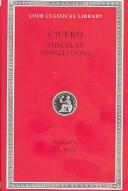
ISBN: 0674991567 Year: 2001 Publisher: Cambridge Harvard university press
Abstract | Keywords | Export | Availability | Bookmark
 Loading...
Loading...Choose an application
- Reference Manager
- EndNote
- RefWorks (Direct export to RefWorks)
We know more of Marcus Tullius Cicero (106-43 BCE), lawyer, orator, politician and philosopher, than of any other Roman. Besides much else, his work conveys the turmoil of his time, and the part he played in a period that saw the rise and fall of Julius Caesar in a tottering republic.
Philosophy, Ancient. --- Happiness --- Philosophy, Ancient --- Ancient philosophy --- Greek philosophy --- Philosophy, Greek --- Philosophy, Roman --- Roman philosophy --- Gladness --- Emotions --- Cheerfulness --- Contentment --- Pleasure --- Well-being
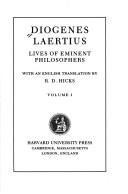
ISBN: 0674992032 9780674992030 0674992040 9780674992047 Year: 1925 Publisher: Cambridge, MA : Harvard University Press,
Abstract | Keywords | Export | Availability | Bookmark
 Loading...
Loading...Choose an application
- Reference Manager
- EndNote
- RefWorks (Direct export to RefWorks)
Philosophers, Ancient --- Philosophers, Ancient. --- Philosophy, Ancient. --- Ancient philosophy --- Greek philosophy --- Philosophy, Greek --- Philosophy, Roman --- Roman philosophy --- Ancient philosophers --- Filósofos --- Filosofía antigua. --- Philosophy, Ancient
Book
ISBN: 9781107012035 9780511997785 Year: 2011 Volume: *17 Publisher: Cambridge New York : Cambridge University Press,
Abstract | Keywords | Export | Availability | Bookmark
 Loading...
Loading...Choose an application
- Reference Manager
- EndNote
- RefWorks (Direct export to RefWorks)
"Ancient philosophers had always been fascinated by religion. From the first century BC onwards the traditionally hostile attitude of Greek and Roman philosophy was abandoned in favour of the view that religion was a source of philosophical knowledge. This book studies that change, not from the usual perspective of the history of religion, but as part of the wider tendency of Post-Hellenistic philosophy to open up to external, non-philosophical sources of knowledge and authority. It situates two key themes, ancient wisdom and cosmic hierarchy, in the context of Post-Hellenistic philosophy and traces their reconfigurations in contemporary literature and in the polemic between Jews, Christians and pagans. Overall, Post-Hellenistic philosophy displayed a relatively high degree of unity in its ideas on religion, which should not be reduced to a preparation for Neoplatonism"--
Philosophy, Ancient --- Religion --- Philosophie ancienne --- Philosophy --- History. --- Philosophie --- Histoire --- Church history --- Religion, Primitive --- Atheism --- God --- Irreligion --- Religions --- Theology --- Ancient philosophy --- Greek philosophy --- Philosophy, Greek --- Philosophy, Roman --- Roman philosophy --- Philosophy&delete& --- History
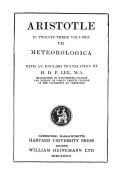
ISBN: 0674994361 9780674994362 Year: 2014 Publisher: Cambridge, MA : Harvard University Press,
Abstract | Keywords | Export | Availability | Bookmark
 Loading...
Loading...Choose an application
- Reference Manager
- EndNote
- RefWorks (Direct export to RefWorks)
Nearly all the works Aristotle (384-322 BCE) prepared for publication are lost; the priceless ones extant are lecture-materials, notes, and memoranda (some are spurious). They can be categorized as practical; logical; physical; metaphysical; on art; other; fragments.
Meteorology --- Logic --- Philosophy --- Philosophy, Ancient --- Rhetoric, Ancient --- Science, Ancient --- Ancient science --- Science, Primitive --- Classical languages --- Greek rhetoric --- Latin rhetoric --- Ancient philosophy --- Greek philosophy --- Philosophy, Greek --- Philosophy, Roman --- Roman philosophy --- Mental philosophy --- Argumentation --- Deduction (Logic) --- Deductive logic --- Dialectic (Logic) --- Logic, Deductive --- Rhetoric --- Science --- Latin language --- Greek language --- Humanities --- Intellect --- Psychology --- Reasoning --- Thought and thinking --- Methodology --- Ancient rhetoric
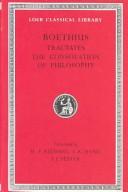
ISBN: 9780674990838 0674990838 0434990744 Year: 2006 Volume: 74 Publisher: Cambridge, MA Harvard University Press
Abstract | Keywords | Export | Availability | Bookmark
 Loading...
Loading...Choose an application
- Reference Manager
- EndNote
- RefWorks (Direct export to RefWorks)
The classical and Christian worlds meet in Boethius (c. 480-524 CE), the last writer of purely literary Latin from antiquity. His Tractates examine the Trinity and incarnation in Aristotelian terms. His Consolation of Philosophy, a dialogue between himself and Philosophy, is theistic in tone but draws on Greek, especially Neoplatonist, sources.
Happiness. --- Philosophy and religion. --- Theology --- Christianity --- Happiness --- Philosophy and religion --- Philosophy --- Philosophy, Ancient --- Scholasticism --- Christian theology --- Theology, Christian --- Religion --- Theology, Scholastic --- Philosophy, Medieval --- Ancient philosophy --- Greek philosophy --- Philosophy, Greek --- Philosophy, Roman --- Roman philosophy --- Mental philosophy --- Humanities --- Christianity and philosophy --- Religion and philosophy --- Gladness --- Emotions --- Cheerfulness --- Contentment --- Pleasure --- Well-being --- Religions --- Church history --- History --- Early church --- Literatuur (letterkunde) --- Godsgeloof --- Philosophy, Ancient. --- Scholasticism.
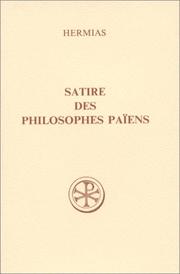
ISBN: 2204048577 9782204048576 Year: 1993 Volume: 388 Publisher: Paris Cerf
Abstract | Keywords | Export | Availability | Bookmark
 Loading...
Loading...Choose an application
- Reference Manager
- EndNote
- RefWorks (Direct export to RefWorks)
Classical Greek literature --- Patrology --- Apologetics --- Apologétique --- Philosophy, Ancient --- -Philosophy, Ancient --- #GOSA:II.P.HER.O --- #GROL:SEMI-276<08> Sour 388 --- Ancient philosophy --- Greek philosophy --- Philosophy, Greek --- Philosophy, Roman --- Roman philosophy --- Apologetics, Missionary --- Christian evidences --- Christianity --- Evidences, Christian --- Evidences of Christianity --- Fundamental theology --- Polemics (Theology) --- Theology, Fundamental --- Religious thought --- Theology --- Early works to 1800 --- Evidences --- Philosophy, Ancient. --- Early works to 1800. --- Apologétique --- Apologetics - Early works to 1800
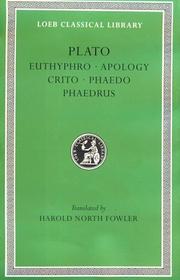
ISBN: 9780674990401 0674990404 0434990361 9780434990368 Year: 1971 Volume: 36 Publisher: London Heinemann
Abstract | Keywords | Export | Availability | Bookmark
 Loading...
Loading...Choose an application
- Reference Manager
- EndNote
- RefWorks (Direct export to RefWorks)
The great Athenian philosopher Plato was born in 427 BCE and lived to be eighty. Acknowledged masterpieces among his works are the Symposium, which explores love in its many aspects, from physical desire to pursuit of the beautiful and the good, and the Republic, which concerns righteousness and also treats education, gender, society, and slavery.
Philosophy, Ancient. --- Philosophie ancienne --- Justice --- Political science --- Utopias --- Greek literature --- Philosophers --- Philosophy, Ancient --- Political and social views --- Ideal states --- States, Ideal --- Utopian literature --- Civil government --- Commonwealth, The --- Government --- Political theory --- Political thought --- Politics --- Science, Political --- Ancient philosophy --- Greek philosophy --- Philosophy, Greek --- Philosophy, Roman --- Roman philosophy --- Socialism --- Voyages, Imaginary --- Dystopias --- Social sciences --- State, The --- Scholars --- Balkan literature --- Byzantine literature --- Classical literature --- Classical philology --- Greek philology --- Political and social views of a person
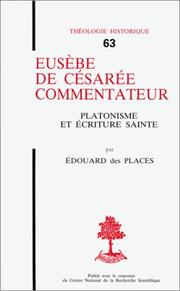
ISBN: 2701010330 2701016770 9782701010335 Year: 1982 Volume: 63 Publisher: Paris Beauchesne
Abstract | Keywords | Export | Availability | Bookmark
 Loading...
Loading...Choose an application
- Reference Manager
- EndNote
- RefWorks (Direct export to RefWorks)
Philosophy, Ancient --- Eusebius, --- Bible --- Criticism, interpretation, etc. --- History --- #GOSA:II.P.EUS-C.O --- #GOSA:II.P.EUS-C.M --- Ancient philosophy --- Greek philosophy --- Philosophy, Greek --- Philosophy, Roman --- Roman philosophy --- Eusebius of Caesarea, Bishop of Caesarea --- Caesarea, Eusebius of, --- Euseb, --- Eusèbe, --- Eusebio, --- Eusebios tou Pamphilou, --- Eusebios, --- Eusebius Pamphili, --- Eusebj Pamffil, --- Evseviĭ, --- Ewsebios Pampʻigheay, --- Qayṣarī, Yūsābiyūs, --- Yūsābiyūs al-Qaṣarī, --- Eusevios, --- Eusevios Kaisareias, --- Biblia --- Eusebius, - of Caesarea, Bishop of Caesarea, - ca. 260-ca. 340
| Listing 1 - 10 of 26 | << page >> |
Sort by
|

 Search
Search Feedback
Feedback About UniCat
About UniCat  Help
Help News
News